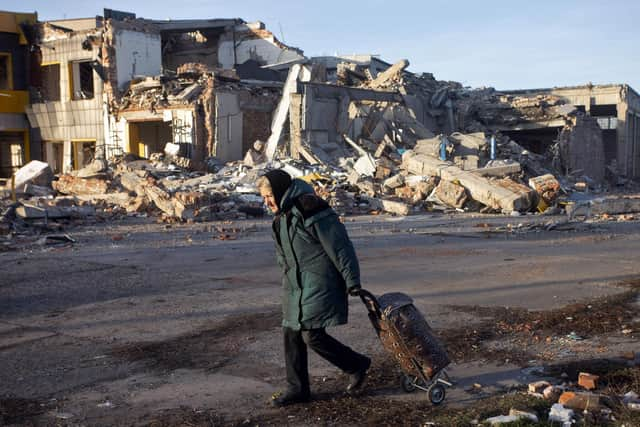Russia's war on Ukraine began in 2014, not 2022, and it must be made to pay for its crimes – Lesia Vasylenko
It’s a question which couldn’t be more wrong, and it revealed how little the world actually knows about Ukraine. Russia’s aggression against Ukraine started in 2014. The exact date is fixed as February 20, 2014, in Ukrainian law. First came the annexation of Crimea and later the illegal occupation of certain areas of the Donetsk and Luhansk regions.
Spring and summer 2014 brought the first wave of civilian casualties, ruined homes and internal refugees at the scale of 1.5 million people. For eight years, the strains of war were felt in the economy and political life. In eight years, 14,000 Ukrainians were killed and at least 30,000 injured. In eight years, a whole generation of Ukrainians were born into war and haven’t known a day in their lives without a mention of some aspect of war. All three of my children belong to this generation, my oldest son being nine years old.
Advertisement
Hide AdAdvertisement
Hide AdSure enough, the scale of Russia’s aggression has grown to unthinkably inhumane levels over the past 12 months: 8,100 civilians killed, 488 of them children, 13,479 injured, ten cities razed to the ground, including the major industrial centres of Mariupol, Bakhmut and Volnovakha. A total of 3,126 schools and other educational facilities have been damaged, with 438 of them completely destroyed, and 3,707 attacks on Ukraine’s healthcare system have led to the ruin of at least 218 hospitals and clinics.
The number of displaced persons – internal and external – varied between 13 million and 14 million throughout 2022. Eight million Ukrainians are reported to have temporarily settled somewhere in Europe or beyond. I guess this last point is what made the war in Ukraine more visible this time.
Whatever the reasons, it is crucial for the world to recognise the events of 2014 and 2022 onwards as the same single act of aggression by Russia against Ukraine. Implying that the invasion started in 2022 is in essence helping the aggressor escape responsibility for eight years of aggression and all the damage, loss, pain and suffering caused within this period.
Russian propaganda and its state machine are more than keen to have the world talk about “the 2014 conflict” and the “war in the Donbas” and the “2022 invasion” as different legal facts. Any ambiguity around Ukraine and chaos around timeframes and definitions gives more room to impunity for war crimes and crimes against humanity.
The battlefield of 21st-century wars extends beyond land, sea and air. Wars are fought through getting into people’s minds and forming narratives. Apart from this, hopefully temporary, slip-up in definitions, the overall understanding has been almost unanimous across the western world: Ukraine and its allies are fighting an existential war. While for the world, it is a battle between good and evil, for Ukraine it is a fight for the right to exist.


In a little over a year now, the narrative has changed from “Ukraine must negotiate with Russia” to “Russia cannot be allowed to win”. Recent developments on the frontline and a reluctance to enter another winter of war crimes and atrocities have now brought about the notion that “Russia must lose”. Yet this idea is approached timidly and almost never publicly.
However, Russia losing this war is the only way to long-standing peace in Europe. A loss for Russia – Putin’s Russia – will also be a victory for the Russian people, at least those among them who long for freedom and a return to a modern system of human rights, such as those 16,000 civil activists who have been arrested and prosecuted for trying to speak up against the regime.
A loss for Russia will bring the world back to a rules-based order and respect for such international legal concepts as territorial integrity, the sovereignty of states and the peaceful co-existence of nations.
Advertisement
Hide AdAdvertisement
Hide AdBut a loss for Russia will not constitute merely a loss on the battlefield. A pull-out of troops from Ukraine – all of Ukraine, Crimea and Donbas included – and an end of this aggression will not be enough. It is a first step only. A victory for Ukraine will need to be built on guarantees of non-repetition of aggression. A victory for humanity is based on the same principle.
These guarantees are clearly defined in the Articles on State Responsibility for Internationally Wrongful Acts, which include justice and compensation. Through mechanisms of international justice, the perpetrators of the aggression must bear responsibility for their actions. Trials must be held for Putin, all of the Russian political establishment and the Russian military command. Those who carried out criminal orders on the battlefield and inside Russia must also be punished.
Based on the list of damage and loss incurred by Ukraine, the sum of reparations must be determined and a schedule of payment worked out. In ideal circumstances, Russia would be willing to pay these amounts voluntarily. In the real world, it is likely, however, that Russian state assets will need to be confiscated to cover part of the cost of Ukrainian recovery. In any case, it is Russia who has brought destruction on Ukraine and it is Russia who must pay.
Until then, the world must unite in its efforts to make sure Russia’s crimes are properly named and labelled and no ambiguity allows the criminals to build a case to escape justice.
Lesia Vasylenko is a Holos MP in Ukraine
Comments
Want to join the conversation? Please or to comment on this article.